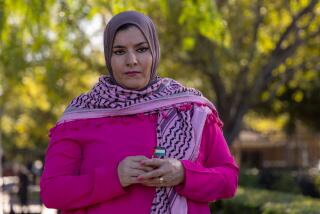A Huge Question Remains Unanswered: ‘Why?’
- Share via
WASHINGTON — John Allen Muhammad visited his estranged family in Maryland in the months before the shooting spree that terrorized the Washington area, neighbors say, a potentially important fact for behavioral scientists trying to determine what turned the would-be businessman and failed husband into an alleged killer.
While a wealth of information about the Washington-area sniper slayings has been revealed in recent days, authorities have said little about what might have motivated Muhammad, 41, and his 17-year old companion, Lee Boyd Malvo.
Was Muhammad, destitute and allegedly involved in a previous robbery, out for money? Was he acting out of political ideology, or anger at American attitudes toward Islam, his adopted religion? Does he have an identifiable mental illness?
“Why now? Why? Why? Why? Why? That’s the question I think everyone is asking,” Malvo’s half-brother Rohan said in an interview with CNN.
“In my experience, it’s a stew of motives that we’re talking about in a crime of this complexity and magnitude,” said Dr. Michael Welner, a forensic psychiatrist at the New York University School of Medicine. But at the same time, Welner said, violent criminals often are motivated by a trigger -- “straws that seemingly break the camel’s back. There are points where the person says: ‘Now it’s time to do this.’ ”
Speculating from limited facts, some specialists in criminal behavior focused Friday on Muhammad’s stormy relationship with his family, particularly the loss of connection to his three children by his second wife, Mildred Denice Muhammad.
Muhammad twice abducted the children from his ex-wife in Tacoma, Wash., taking them out of the country on one occasion. Last fall, after a county sheriff’s office returned the children to Mildred Muhammad, she fled with them to live with relatives in Clinton, Md.
“Losing a job, having kids taken away -- those are the kinds of huge, major events that people respond to” by committing crimes, said forensic scientist Brent Turvey, author of the textbook Criminal Profiling.
“But it can take months for that to happen,” Turvey said. “People get depressed, the depression turns to anger, and that anger might be directed at other people.”
Criminal psychologists said it was noteworthy that Muhammad had come to his ex-wife’s Maryland neighborhood in recent months.
Neighbor Robert Graves ran into Muhammad in Clinton about a month ago while Graves was walking his dogs.
And Nzingha Raufu, 13, said she saw Muhammad pick up his eldest son, John Allen Jr., 12, to go on a picnic about three months ago. Raufu, who attends seventh grade with John, said she talked to the boy later, and he did not talk about any tension with his father.
The contact with his family could be an important element of Muhammad’s emotional life before the shooting spree, and possibly a trigger to violence, criminal behavior specialists said.
“I sure would like to know what happened there,” said Eric Hickey, who teaches criminal psychology at Cal State Fresno. “I’m wondering, did he have a stark realization then of loss and regret? Did that fuel his anger?”
He speculated that seeing his son might have reminded Muhammad he had failed in many aspects of his life: A planned karate school and an auto repair business had gone bust, two marriages had collapsed and he was unable to maintain intimacy with his family.
Others said a political motive may have brought Muhammad to Washington, and that it was coincidental that his family was nearby.
Jack Levin, a criminologist at Northeastern University in Boston, speculated Muhammad might have harbored resentment against Americans in general for a perceived abuse of Muslims after the Sept. 11, 2001, terrorist attacks. Moreover, he noted, Malvo was an illegal immigrant from Jamaica and subject to deportation.
“Both of them may have felt abused since 9/11,” Levin said.
Others noted that Muhammad had a long history of trying to control his family and of resorting to violence when he did not get his way.
But after losing his business and family, Muhammad may have seen a shooting spree as a way to exert control over an entire region of the country. Residents spent weeks in fear, and police were forced to repeat certain phrases dictated by the killer.
“These crimes are partly a desire to be seen not just in control, but to demonstrate superiority,” Turvey said. “It’s all about being perceived as skillful and powerful.”
Another factor in Muhammad’s motivation may have been his relationship with Malvo.
“Sometimes the insanity is in the relationship,” Levin said. “People will do the most horrific things when they’re together that they wouldn’t do individually, because they are feeding on each other’s fantasies.”
Still, profit would be one motive among many, Levin said.
“This guy lost his company,” he said, summing up. “He was in his second nasty divorce. He lost custody of his children. He was a homeless guy. He had no job and no hope for the future.
“Then, here’s a chance to make $10 million fast, and at the same time get even with all those Americans who abused -- from his point of view -- Muslims and immigrants since 9/11. So, why not do it?”
*
Times staff writer Richard Simon contributed to this report.
More to Read
Sign up for Essential California
The most important California stories and recommendations in your inbox every morning.
You may occasionally receive promotional content from the Los Angeles Times.









